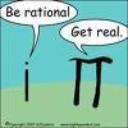Yahoo Answers is shutting down on May 4th, 2021 (Eastern Time) and the Yahoo Answers website is now in read-only mode. There will be no changes to other Yahoo properties or services, or your Yahoo account. You can find more information about the Yahoo Answers shutdown and how to download your data on this help page.
Trending News
Help converting complex number to standard form!?
Write the following complex number into standard form:
(√3 + i)^100
Any help would be greatly appreciated!
3 Answers
- coreyALv 66 years agoFavorite Answer
It's best to use the form r(cos(θ) + isin(θ)) for a problem like this as it allows you to use De Moivre's theorem. Given a + bi:
r = √(a² + b²)
θ = tan⁻¹(b/a)
In this example:
r = 2
θ =π/6
Now you would want to verify that the angle is correct, which in this case it is since √3 + i is in the 1st quadrant. But you'd want to verify where the angle is so that you use the correct angle for De Moivre's theorem. De Moivre's theorem says:
(r(cos(θ) + isin(θ)))ⁿ = rⁿ(cos(nθ) + isin(nθ))
Rewrite √3 + i:
2(cos(π/6) + i sin(π/6))
Now raise to 100
(2(cos(π/6) + i sin(π/6)))¹⁰⁰ = 2¹⁰⁰(cos(100π/6) + isin(100π/6))
Convert 100π/6 to and angle on [0,2π).
100π/6 = 16π + 4π/6 = 16π + 2π/3
16π is just 8 full rotations, and your left with 2π/3, so (√3 + i)¹⁰⁰ turns into:
2¹⁰⁰(cos(2π/3) + isin(2π/3))
Which reduces to:
2¹⁰⁰(-¹/₂ + i√3/2)
Now distribute to get:
-2⁹⁹ + i2⁹⁹√3
- MorningfoxLv 76 years ago
That's a big number, about -0.6338x10^30 + 1.0978x10^30 i.
In order to compute it, first convert (sqrt(3) + i ) to polar form, r @ angle
Then (r @ angle)^100 is r^100 @ (100 angle).
r^100 is not so hard to figure, and for 100 angle you need to subtract multiples of 2pi (or 360 degrees).
Once you have done all that, convert back to standard xy form.
- ted sLv 76 years ago
( √3 + i ) = 2 [ cos π/6 + i sin π / 6 ] = 2 e^(iπ/6) --->
answer is 2^(100) [ cos (100π/6 ) + i sin (100π / 6 ) ] = 2^100 [ - 1/2 + i √3 / 2 ]




